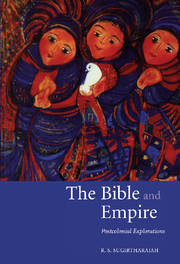Book contents
- Frontmatter
- Contents
- Acknowledgements
- Introduction
- 1 Textually conjoined twins: Rammohun Roy and Thomas Jefferson and their Bibles
- 2 Salvos from the Victorian pulpit: conscription of texts by Victorian preachers during the Indian rebellion of 1857
- 3 Thorns in the crown: the subversive and complicit hermeneutics of John Colenso of Natal and James Long of Bengal
- 4 Texts and Testament: the Hebrew scriptures in colonial context
- 5 Imperial fictions and biblical narratives: entertainment and exegesis in colonial novels
- Afterword
- Select bibliography
- Index of biblical references
- Index of names and subjects
5 - Imperial fictions and biblical narratives: entertainment and exegesis in colonial novels
Published online by Cambridge University Press: 02 December 2009
- Frontmatter
- Contents
- Acknowledgements
- Introduction
- 1 Textually conjoined twins: Rammohun Roy and Thomas Jefferson and their Bibles
- 2 Salvos from the Victorian pulpit: conscription of texts by Victorian preachers during the Indian rebellion of 1857
- 3 Thorns in the crown: the subversive and complicit hermeneutics of John Colenso of Natal and James Long of Bengal
- 4 Texts and Testament: the Hebrew scriptures in colonial context
- 5 Imperial fictions and biblical narratives: entertainment and exegesis in colonial novels
- Afterword
- Select bibliography
- Index of biblical references
- Index of names and subjects
Summary
But the one rule to remember is: the sacred text is actually enemy of every other.
William H. GassThis chapter focusses on the employment of the Bible in two colonial novels: Sydney Owenson's The Missionary: An Indian Tale (1811) and Akiki K. Nyabongo's Africa Answers Back (1936). Sydney Owenson (1783–1859), who later became Lady Morgan through marriage to a knighted English physician, Charles Morgan, was an Irish literary figure. Her literary production extended over six decades; it included novels, poems and travel and political writings. She was a complex personality. She championed the cause of Irish nationalism but was reluctant to support women's participation in politics. Nyabongo, an African chief from Uganda, was educated at Yale and Oxford and played a critical role in Uganda before and after independence. Besides his political involvement, he was visible in international literary guilds and acted as the editor of African Magazine.
Both novels, The Missionary and Africa Answers Back, were shaped by a confused mixture of religious enthusiasm, colonial attitudes to people, and the forces of modernity which came in the wake of colonialism. The Missionary takes a Eurocentric view of India and of colonial practices, in which identities of both the colonizer and the colonized are questioned and reframed. Africa Answers Back, on the other hand, takes a nativist view of colonialism and seeks to invoke through the main character the uneasiness and uncertainty of the colonized ‘other’. Both novels expose intra-Christian differences which have implications far beyond Europe.
- Type
- Chapter
- Information
- The Bible and EmpirePostcolonial Explorations, pp. 192 - 221Publisher: Cambridge University PressPrint publication year: 2005



